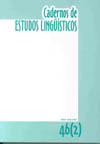Abstract
No seu livro “Wie Metaphern Wissen schaffen” (“Como metáforas criam conhecimento”), o lingüista Olaf Jäkel dedica-se a uma sistematização e reformulação da teoria cognitiva das metáforas, fundada pelos norte-americanos George Lakoff e Mark Johnson. Neste contexto, ele também remete-se a algumas teorias precursoras de outras áreas, dentre elas, ao pensamento de Immanuel Kant, que implica muitas semelhanças principalmente quanto aos elementos básicos da lingüística cognitiva em geral, embora Lakoff e Johnson recusem a teoria kantiana globalmente, por suspeitá-la objetivista. O presente artigo tem como objetivo, depois de ter resumido as caraterísticas essenciais da teoria cognitiva das metáforas, sintetizada por Jäkel, a apresentação de três linhas filosóficas nas quais encontram-se observações sobre metáforas que antecipam a teoria de Lakoff e Johnson: a filosofia da língua/a crítica da língua, a filosofia kantiana e a filosofia fenomenológica de Hans Blumenberg.References
BLUMENBERG, Hans. (1979). Schiffbruch mit Zuschauer: Paradigma einer Daseinsmetapher. Frankfurt am Main: Suhrkamp.
BLUMENBERG, Hans. (1971). Beobachtungen an Metaphern. In: GRÜNDER, Karlfried (ed.). Archiv für Begriffsgeschichte. Band 15. Bonn: Bouvier, pp. 161-214.
BLUMENBERG, Hans. (1960). Paradigmen zu einer Metaphorologie. In: ROTHACKER, Erich (ed.). Archiv für Begriffsgeschichte. Band 6. Bonn: Bouvier, pp. 7-142.
CASSIRER, Ernst. (1973). Philosophie der symbolischen Formen. Band 1. Die Sprache. Darmstadt: Wissenschaftliche Buchgesellschaft.
JÄKEL, Olaf. (2003). Wie Metaphern Wissen schaffen. Hamburg: Verlag Dr. Kovaè.
JOHNSON, Mark. (1980). A Philosophical Perspective on the Problems of Metaphor. In: HONECK, Richard P. & HOFFMAN, Robert R. (ed.). Cognition and Figurative Language. Hillsdale, New Jersey: Erlbaum, pp. 47-67.
KANT, Immanuel. (1986). Kritik der reinen Vernunft. Hamburg: Felix Meiner.
KANT, Immanuel. (1990). Kritik der Urteilskraft. Hamburg: Felix Meiner.
KANT, Immanuel. (1976). Prolegomena zu einer jeden künftigen Metaphysik, die als Wissenschaft wird auftreten können. Hamburg: Felix Meiner.
LAKOFF, George. (1987). Women, Fire, and Dangerous Things: What Categories Reveal about the Mind. Chicago/London: The University of Chicago Press.
LAKOFF, George & JOHNSON, Mark. (1980). Metaphors We Live By. Chicago: The University of Chicago Press.
LAKOFF, George & TURNER, Mark. (1989). More than Cool Reason: A Field Guide to Poetic Metaphor. Chicago/London: The University of Chicago Press.
LOCKE, John. (1988). An Essay concerning Human Understanding. Oxford: Oxford University Press.
MAUTHNER, Fritz. (1982). Beiträge zu einer Kritik der Sprache. Erster Band: Zur Sprache und zur Psychologie. Frankfurt am Main, Berlin, Wien: Ullstein.
NIETZSCHE, Friedrich. (1999). Die Geburt der Tragödie. Unzeitgemäße Betrachtungen I-IV. Nachgelassene Schriften 1870-1873. Kritische Studienausgabe in 15 Bänden. Band 1. München: Deutscher Taschenbuch Verlag.
RYLE, Gilbert. (1973). The Concept of Mind. Harmondsworth, Middlesex: Penguin Books Ltd.
SAPIR, Edward. (1949). Selected Writings of Edward Sapir in Language, Culture and Personality. Los Angeles: University of California Press.
WHORF, Benjamin Lee. (1973). Language, Thought and Reality. Selected Writings of Benjamin Lee Whorf. Cambridge, Massachusetts: The M.I.T. Press.
WITTGENSTEIN, Ludwig. (1994). Investigações Filosóficas. Petrópolis: Vozes.
The journal CADERNOS DE ESTUDOS LINGUÍSTICOS is granted all the copyright related to the published works. The originals will not be returned. By virtue of being part of this public access journal, the articles are free to use, with their own attributions, in educational and non-commercial applications

